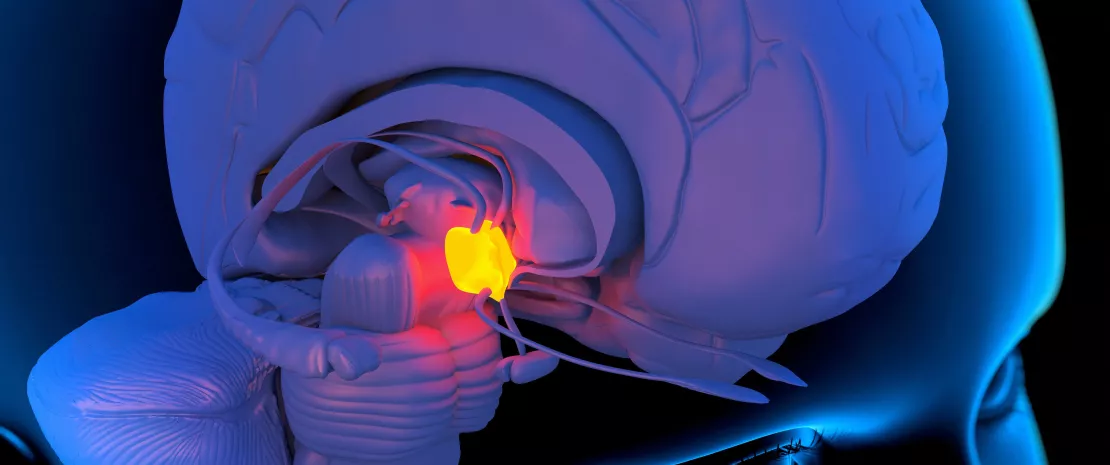Anorexia nervosa: is the unconscious mind influenced by the gut microbiota?
In anorexia nervosa, certain cognitive processes related to learning may be impaired. A team of researchers has just discovered that this deficit could be linked to changes in the gut microbiota, particularly to imbalances in certain bacteria involved in gut–brain communication.
Lay public section
Find here your dedicated section
Sources
This article is based on scientific information

About this article
Anorexia nervosa is a psychiatric disorder classified as an eating disorder. It can have serious health consequences and carries a significant risk of becoming chronic or even fatal. Anorexia nervosa is characterized by voluntary food restriction that leads to severe weight loss and is often linked to bulimia, anxiety and behavioral disorders that can contribute to other health problems.
50% Cases identified during adolescence can be treated successfully.¹
Between 1/4 and 1/2 Of affected individuals discontinue active treatment.¹
Psychotherapy combined with nutritional rehabilitation is the recommended approach for reestablishing normal eating habits. However, patient responses vary and some eating disorder symptoms such as bulimia and anxiety may persist.
How the microbiota impacts cognitive functions
In 2023, psychiatrists at the University of Graz in Austria identified an alteration in implicit learning (the unconscious acquisition of knowledge) that may partly explain the lack of response to treatment. In a new study, the same team suggests that this impairment could be linked… to the microbiota!2
It is known that the gut microbiota influences cognitive functions through the
(sidenote:
Gut-brain axis
Two-way communication network between the gut and the brain, which allows the gut and brain to communicate via three different pathways:
1. the neuronal pathway (neurons), mainly via the vagus nerve and the enteric nervous system,
2. the endocrine pathway, by secreting hormones such as cortisol, adrenaline and serotonin
3. the immune system pathway, by modulating cytokines
The gut-brain axis influences our behavior, cognition (memory), emotions, moods, desires, perception... and pain, among other things.
)
. This axis modulates the neuroendocrine system, particularly the hypothalamic–pituitary–adrenal axis, which regulates stress responses and cortisol production. The enteric nervous system is also involved in bidirectional communication with the autonomic nervous system and the vagus nerve, as are neurotransmitters (GABA, dopamine, serotonin, etc.) produced by the microbiota.
Based on this observation, the Austrian scientists compared memory and implicit learning abilities as well as the microbiota of 15 patients with anorexia nervosa to those of 13 healthy control women.
20% Of patients remain anorexic for life.¹
5% Of cases result in death.¹
Lower learning scores linked to less diverse microbiota
The results show that in the anorexia group:
- implicit learning scores are lower than those of healthy controls, while memory scores are similar;
- the gut microbiota shows an increased abundance of Akkermansia muciniphila, whereas in the control group, short-chain fatty acid ( (sidenote: Short chain fatty acids (SCFA) Short chain fatty acids (SCFA) are a source of energy (fuel) for an individual’s cells. They interact with the immune system and are involved in communication between the intestine and the brain. Silva YP, Bernardi A, Frozza RL. The Role of Short-Chain Fatty Acids From Gut Microbiota in Gut-Brain Communication. Front Endocrinol (Lausanne). 2020;11:25. ) )-producing bacteria such as Faecalibacterium are more prevalent.
Overall, higher implicit learning scores are linked to greater microorganism diversity and a higher number of distinct species:
- a high score was associated with an increase in Actinobacteria, especially Bifidobacteria, key microorganisms in gut–brain communication that may reduce anxiety via vagal pathways and thereby influence learning processes;
- a low score, in contrast, was associated with an increase in Lachnospiraceae, which several studies have linked to depressive disorders that may impair brain function and implicit learning.
Toward new treatment approaches
Despite certain limitations (small sample size, lack of dietary and educational data, absence of male participants), this study shows promise. It opens the door to potential new treatment strategies for managing disorders such as anorexia nervosa.
Next step for researchers: conduct interventional studies targeting the gut microbiota, including through probiotics like bifidobacteria.




